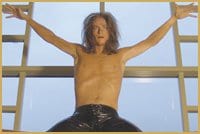For rock musician T, art can be a place to deal with devastating personal experiences.
In his new rock opera Southern Time, which played at the WISE Hall Dec 4-10, the local rock singer/cellist deals with one of the most pivotal moments of his life: his discovery, at age 20, that he was HIV-positive.
The show begins in December 2001, with T’s surrogate, Dreamer, reflecting on the events of five years prior, when he found out about his status.
Flashback to 1996 when Dreamer, a promising classical cellist, is studying with his professor in Alberta. We soon discover not only that the professor is a controlling and destructive individual, but that he and Dreamer have been having a sexual relationship.
The story then takes us to Germany, where Dreamer has been accepted as a student in an elite music school. His mother, still reeling from the revelation that he’s been sleeping with his professor, phones to tell him that the professor is HIV-positive, and urges him to get tested.
When the test comes back positive, Dreamer embarks on a spiritual and emotional journey that takes him to a place of enlightenment, self-acceptance and hope.
Despite the medical advances made in recent years, HIV/AIDS is still considered by most to be fairly dark subject matter-hardly the kind of fare one would want to take in during the holiday season.
So how does T keep the show from being unsparingly bleak? “By throwing in some humour, and some of the songs are very funny,” says the 29-year-old musician as he munches down on a vegetarian sandwich at Café Calabria on Commercial Dr.
And he’s quick to point out that he himself doesn’t believe the subject matter to be bleak: “Personally, I don’t believe that HIV necessarily equals death. I don’t think the doctors and scientists are God. They’re not the be-all end-all. They don’t know everything.
“I think Western medicine is a bit flawed in thinking that everything comes down to the physical and that everything can be measured and quantified. There’s a whole lot more to health.”
So where, for T, is the hope in the story? It lies between Dreamer’s depression, as he despaired that he’d never have a normal sexual relationship again, and “the manifestation of where I am now as T-and the way I progressed from one stage to another.”
Originally from Kamloops, T-who considers himself bisexual and whose real name is Tim Bartsch-started out, like Dreamer, in classical music, taking up the cello at age eight and studying it intensely for 12 years.
“What I loved about music was expressing emotion,” he says. It’s “something that can reach people-music can make a difference, right? So that’s why I started writing songs.”
What was presented at the WISE Hall was a teaser- audiences saw just the first act of the three-act show, after which T and his band belted out the songs from the second and third acts. (T hopes to produce the full show next summer.)
The show needs tightening and polishing-many of the scenes are extraneous, and some of the writing borders on the portentous. Though the music has interesting rhythmical and harmonic moments, T needs to articulate more when he sings, as deciphering the lyrics would help the audience more fully appreciate the themes he’s trying to convey.
Musically, the highlight of the show was T’s dazzling cello solo in Act One (how often does one see a cellist in a rock band?) and T would be well advised to incorporate more of this unique ability into the other songs.
Audience feedback, says T, has generally been very positive. “People have really liked it. [They’ve said] that it’s something they haven’t seen before, that there’s so much visual stimulation and good music.”
Response from HIV-positive audience members has been particularly enthusiastic. “They’ve found it quite inspiring,” T says. “It hit home.”
Press material on the show says that it offers “a rare look into the pivotal moment when someone with little faith left in his society, civilization, or with love, is forced to discover the meaning of his life.”
When asked the inevitable question, T responds that the meaning of his life “is that you have to take responsibility for yourself, and that you do have power, and no one can take that away unless you give it away.”

 Why you can trust Xtra
Why you can trust Xtra


